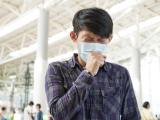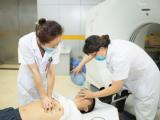Dec 14, 2004 (CIDRAP News) The National Institute of Allergy and Infectious Diseases (NIAID) has announced the start of its first human trial of a vaccine for SARS (severe acute respiratory syndrome), less than 2 years after the disease was first recognized.
The agency will test the vaccine for safety and the ability to stimulate an immune response in 10 healthy volunteers at the National Institutes of Health (NIH) Clinical Center in Bethesda, Md., the NIAID said in a news release yesterday.
Officials said the vaccine was developed with "unprecedented speed," given that SARS was not recognized as a new infectious disease until March 2003 and that it often takes decades to develop a successful vaccine. "We have dramatically cut vaccine development time with powerful new tools from two different fields, molecular biology and information technology," stated NIAID Director Anthony S. Fauci, MD.
The vaccine is innovative in that it consists of a small ring of SARS coronavirus DNA that encodes the virus's "spike" protein, which helps the virus attach to human cells, the NIAID said. In contrast, conventional vaccine technology usually involves the use of a weakened or inactivated form of the whole virus.
Chinese researchers began clinical trials of another experimental SARS vaccine, using inactivated SARS virus, last May, the NIAID noted. The Chinese government said last week that the vaccine had proved safe and effective in a phase 1 clinical trial involving 36 volunteers.
In making the NIAID vaccine, researchers modified the fragment of viral DNA to minimize the risk that it could combine with the SARS virus or other coronaviruses, the NIAID said.
The primary purpose of the trial is to test the vaccine's safety, and the secondary goal is to assess its ability to trigger the production of antibodies and cellular immunity, officials said. The 10 volunteers will undergo periodic exams for 32 weeks after vaccination.
"Scientists expect that the DNA will direct human cells to produce proteins very similar to the SARS spike protein," the agency said. "The immune system should recognize these proteins as foreign and then mount a defense against them. If the vaccinated person ever encounters the actual SARS virus, his or her immune system will be primed to neutralize it."
Vical Inc. of San Diego is producing the new vaccine under a contract with the NIAID.
The agency noted that Hong Kong researchers first proved that SARS was a viral disease in April 2003. The virus was genetically mapped by May 2003, which opened many avenues for developing diagnostic tests, treatments, and vaccines.
A team led by Gary J. Nabel, MD, director of the NIAID Vaccine Research Center, used the SARS virus genomic information to develop the new vaccine. The vaccine performed very well in mice, as reported by the team in Nature in March 2004.
The NIAID said more information about the SARS vaccine trial can be obtained by calling the Vaccine Research Center at 1-866-833-LIFE or visiting the center's Web site (see link below).
See also:
Dec 13 NIH release on SARS vaccine trial
Mar 31, 2004, CIDRAP News story "SARS vaccine works well in mice, NIAID says"


















